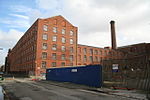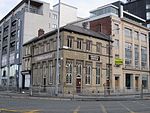Royal Mill

Royal Mill, which is located on the corner of Redhill Street and Henry Street, Ancoats, in Manchester, England, is an early-twentieth-century cotton mill, one of the last of "an internationally important group of cotton-spinning mills" sited in East Manchester. Royal Mill was constructed in 1912 on part of the site of the earlier McConnel & Kennedy mills, established in 1798. It was originally called New Old Mill and was renamed following a royal visit by King George VI and Queen Elizabeth in 1942. A plaque commemorates the occasion. The Ancoats mills collectively comprise "the best and most-complete surviving examples of early large-scale factories concentrated in one area".
Excerpt from the Wikipedia article Royal Mill (License: CC BY-SA 3.0, Authors, Images).Royal Mill
Redhill Street, Manchester Ancoats
Geographical coordinates (GPS) Address Nearby Places Show on map
Geographical coordinates (GPS)
| Latitude | Longitude |
|---|---|
| N 53.4831 ° | E -2.2278 ° |
Address
Royal Mill
Redhill Street 19
M4 5BA Manchester, Ancoats
England, United Kingdom
Open on Google Maps











